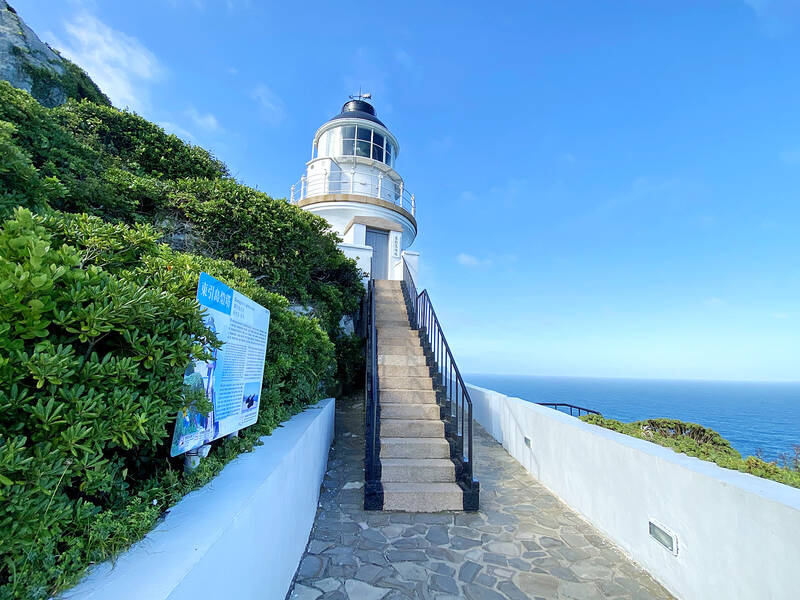Internet service in Lienchiang County should return to normal by the end of April after an international cable maintenance ship on April 20 begins repairing broken undersea connections around the Matsu Islands, the National Communications Commission said yesterday.
Lienchiang County’s online access is served by two marine cables — Taima No. 2 (台馬二號) cable connecting Dongyin (東引) Island to New Taipei City’s Tamsui District (淡水), and Taima No. 3 (台馬三號) cable connecting Nangan Island to Taoyuan.
Both cables were damaged separately on Feb. 2 and Wednesday last week leaving residents with slow Internet connections and unstable phone service.

Photo: Yu Chao-fu, Taipei Times
The Taima No. 2 cable was broken by a Chinese fishing boat, while the Taima No. 3 was damaged by a cargo ship, the commission said.
The incidents mark the second time that the two cables were broken within a short period.
Prior to the incident, the Lienchiang cables were frequently damaged by Chinese sand pump dredgers.
“It would take more than 10 minutes to send a text message, and sending a picture would take even longer,” Democratic Progressive Party (DPP) Lienchiang County chapter director Li Wen (李問) told the Taipei Times.
“The booking system in hostels and logistics services cannot function normally either, let alone viewing content and films on social media,” Li said.
Chunghwa Telecom (CHT) maintained service between Taiwan proper and Lienchiang County through a microwave backup system, which transmits telecom signals from a ground station in Yangmingshan National Park, Commission Vice Chairman and spokesman Wong Po-tsung (翁柏宗) told the Taipei Times.
Commission officials, Chinese Nationalist Party (KMT) Legislator Chen Hsueh-sheng (陳雪生) and Democratic Progressive Party (DPP) Legislator Hung Sun-han (洪申翰) inspected the microwave system on Tuesday, Wong said.
The company was asked to accelerate and stabilize Internet and phone services for Lienchiang County residents by expanding the bandwidth, he said.
The microwave backup system offers a speed of 2.2 gigabits per second (Gbps), Wong said.
CHT is aiming to expand the bandwidth to 3.8 Gpbs next month, 4.382 Gpbs in June and 8.148 Gpbs by the end of this year, Wong said.
Cable communication from Matsu to Taiwan has a speed of 8 to 9 Gbps, he added.
The Ministry of Digital Affairs is offering additional frequency bands to help the telecom expand the microwave system, Wong said.
CHT yesterday said it would waive monthly fees for Lienchiang County subscribers of its fixed network, Hinet, on-demand media and mobile services this month.
Undersea cables connecting Lienchiang County islands with Taiwan proper were damaged five times in 2021 and four times last year, CHT said.
The cost of repairing one cable varies from NT$10 million to NT$20 million (US$330,251 to US$660,502) CHT said, adding that the operation of a cable maintenance ship costs US$40,000 per day.
CHT said that it is considering installing an alert system to help it identify culpable parties that damage the cables.
The KMT caucus told a news conference that the undersea cables are basic national infrastructure, and could cause a national security crisis when both are broken.
The incident also exposed the fragility of the basic infrastructure in Matsu, the caucus said.
The Democratic Progressive Party (DPP) caucus accused China of deliberately damaging the cables considering how often they are broken.
“Beijing should stop its ships from harassing Taiwan and Lienchiang County,” the DPP caucus said. “We also ask the KMT Deputy Chairman Andrew Hsia (夏立言) to protest the incident when meeting with Chinese officials, rather than following their political agenda.”

POSITIVE DEVELOPMENT: Japan and the US are expected to hold in-depth discussions on Taiwan-related issues during the meeting next month, Japanese sources said The holding of a Japan-US leaders’ meeting ahead of US President Donald Trump’s visit to China is positive news for Taiwan, former Japan-Taiwan Exchange Association representative Hiroyasu Izumi said yesterday. After the Liberal Democratic Party’s landslide victory in Japan’s House of Representatives election, Japanese Prime Minister Sanae Takaichi is scheduled to visit the US next month, where she is to meet with Trump ahead of the US president’s planned visit to China from March 31 to April 2 for a meeting with Chinese President Xi Jinping (習近平). Japan and the US are expected to hold in-depth discussions on Taiwan-related issues during the

‘LIKE-MINDED PARTNER’: Tako van Popta said it would be inappropriate to delay signing the deal with Taiwan because of China, adding he would promote the issue Canadian senators have stressed Taiwan’s importance for international trade and expressed enthusiasm for ensuring the Taiwan-Canada trade cooperation framework agreement is implemented this year. Representative to Canada Harry Tseng (曾厚仁) in an interview with the Central News Agency (CNA) said he was increasingly uneasy about Ottawa’s delays in signing the agreement, especially as Ottawa has warmed toward Beijing. There are “no negotiations left. Not only [is it] initialed, we have three versions of the text ready: English, French and Mandarin,” Tseng said. “That tells you how close we are to the final signature.” Tseng said that he hoped Canadian Prime Minister Mark Carney

President William Lai (賴清德) yesterday bestowed one of Taiwan’s highest honors on Saint Vincent and the Grenadines (SVG) Ambassador Andrea Clare Bowman in recognition of her contributions to bilateral ties. “By conferring the Order of Brilliant Star with Grand Cordon on Ambassador Bowman today, I want to sincerely thank her, on behalf of the Taiwanese people, for her outstanding contribution to deepening diplomatic ties between Taiwan and SVG,” Lai said at a ceremony held at the Presidential Office in Taipei. He noted that Bowman became SVG’s first ambassador to Taiwan in 2019 and

A man walks past elementary school artworks at the Taipei Lantern Festival in Ximen District yesterday, the first day of the event. The festival is to run from 5pm to 10pm through March 15.